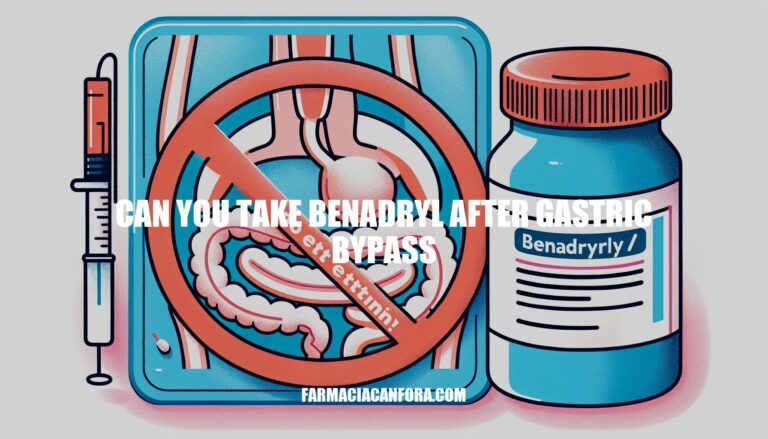


Understanding medication use after gastric bypass surgery is crucial for ensuring safe and effective recovery. Benadryl (diphenhydramine) is commonly used to manage allergies and sleep issues, but its absorption and effects can be altered post-surgery. Consulting healthcare providers about medication adjustments is essential to avoid complications and ensure optimal health outcomes.
Gastric bypass surgery, specifically the Roux-en-Y procedure, involves creating a small pouch from the stomach and connecting it directly to the small intestine, bypassing a large part of the stomach and the first section of the small intestine. This significantly reduces the stomach’s capacity and alters the digestive process.
Benadryl, also known as diphenhydramine, is an antihistamine commonly used to relieve symptoms of allergy, hay fever, and the common cold. These symptoms include rash, itching, watery eyes, itchy eyes/nose/throat, cough, runny nose, and sneezing. It is also used to prevent and treat nausea, vomiting, and dizziness caused by motion sickness, and to induce sleep.
After gastric bypass surgery, someone might consider taking Benadryl to manage nausea and vomiting, which are common post-surgery complications. Additionally, it can help alleviate itching caused by certain pain medications. However, it’s important to consult with a healthcare provider before taking any medication post-surgery to ensure it’s safe and appropriate for individual circumstances.
Taking Benadryl (diphenhydramine) after gastric bypass surgery can pose several risks and side effects due to altered drug absorption and the body’s changed physiology:
Altered Absorption: Gastric bypass surgery changes the digestive system, which can affect how medications are absorbed. This can lead to either reduced effectiveness or increased side effects of Benadryl.
Drowsiness and Sedation: Benadryl is known for causing drowsiness and sedation. After gastric bypass, these effects might be more pronounced due to altered drug metabolism.
Dry Mouth and Constipation: Common side effects like dry mouth, dry nose, and constipation can be exacerbated post-surgery, as the body might react differently to the medication.
Risk of Ulcers: There’s an increased risk of developing stomach ulcers after gastric bypass surgery. While Benadryl itself isn’t a direct cause, any medication that irritates the stomach lining should be used cautiously.
Nutritional Deficiencies: Gastric bypass patients often face nutritional deficiencies. Benadryl can sometimes interfere with nutrient absorption, potentially worsening these deficiencies.
It’s crucial to consult with a healthcare provider before taking Benadryl or any new medication after gastric bypass surgery to ensure safety and proper management of side effects.
After gastric bypass surgery, using Benadryl (diphenhydramine) is generally considered safe for managing nausea and vomiting, which are common post-surgery complications. However, it’s crucial to consult with your healthcare provider before taking any medication, as absorption and effectiveness can vary due to changes in your digestive system.
Here are some key points to consider:
If you have any specific concerns or symptoms, it’s best to reach out to your healthcare provider for personalized advice.
After gastric bypass surgery, it’s essential to consult with a healthcare provider before taking Benadryl (diphenhydramine) due to altered drug absorption and potential side effects.
Consider using liquid, soft-gel, or crushed tablet forms if necessary, and avoid NSAIDs like ibuprofen and aspirin to minimize the risk of stomach ulcers.
If you have specific concerns or symptoms, reach out to your healthcare provider for personalized advice.